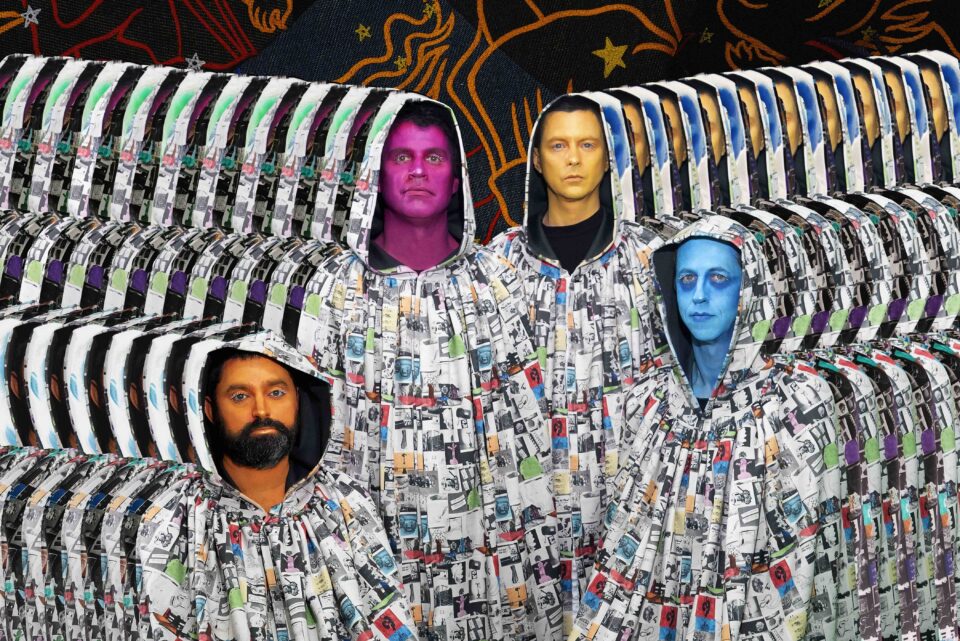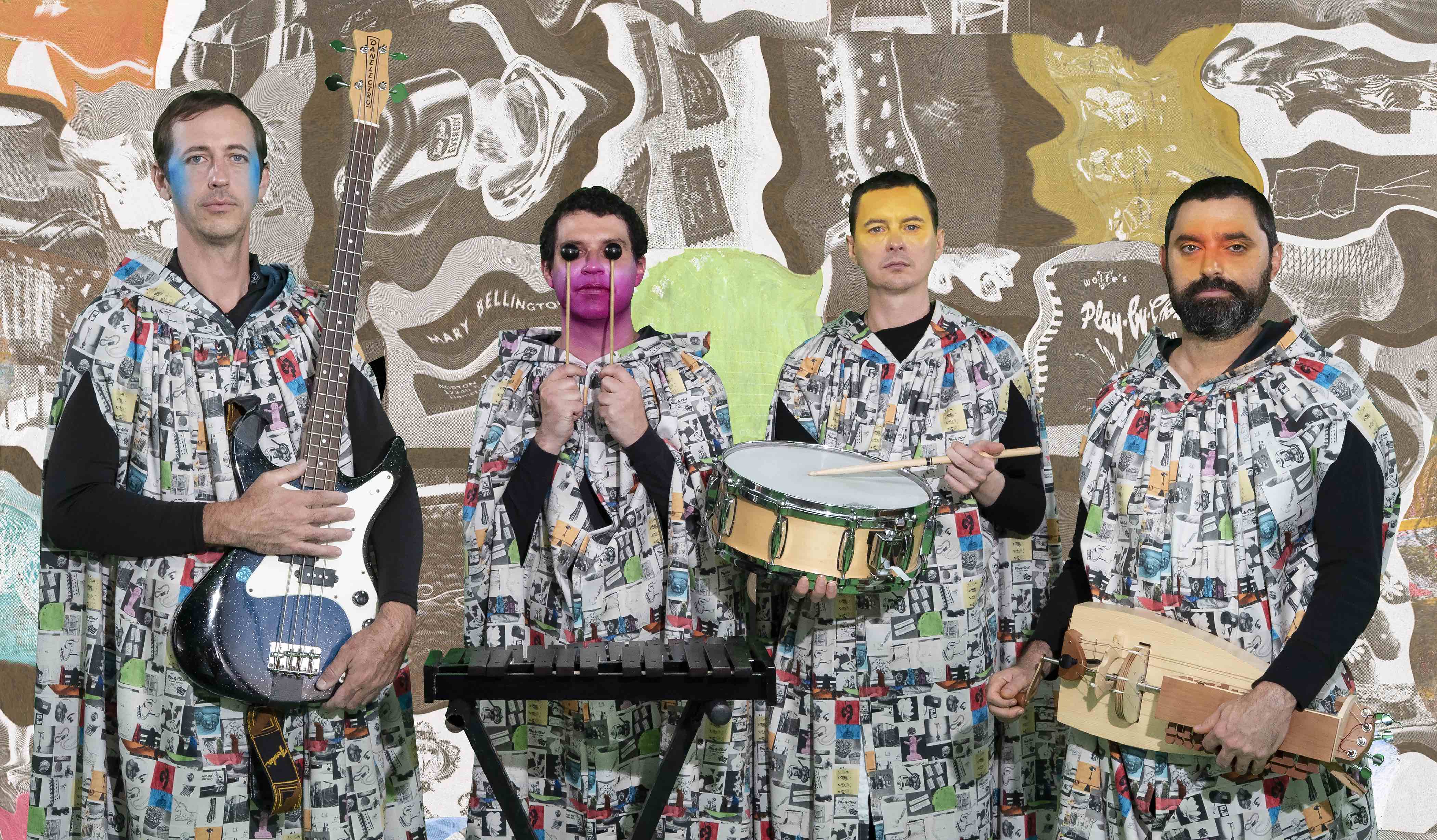It’s been a decade since Animal Collective released an album with all four of its core members. Over that time, the group has evolved from fringey avant-garde pranksters to elder statesmen of modern indie rock, influencing an entire generation of artists and inspiring a cultishly devoted fan base that’s helped make them seem like the 21st century’s answer to the Dead.
After a series of high-concept projects, including a live album recorded in a sound sculpture installation and a visual album inspired by reef ecology, the quartet has reunited for Time Skiffs, an LP that feels like a return to form, despite the fact that no other Animal Collective recording before has ever sounded like this. With its traditional rock-band instrumentation and a “live” vibe (despite each member tracking their own parts separately due to quarantine concerns), it’s the closest the group has come to capturing the feel of four guys banging out tunes in a practice space, exuding a deeply grounded energy that’s especially welcome in this chaotic moment.
We caught up with member Josh Dibb, a.k.a. Deakin, while he was running errands in Baltimore, the city of AnCo’s inception.
I'm curious to hear how this record came together and sort of the creative process behind it.
It was sort of a long journey, but I think [it came together] in a very organic fashion. Starting around 2015, myself and Dave [Portner, a.k.a. Avey Tare] both sort of developed this new love for New Orleans. It's one of the cities I had passed through on tour a number of times, and we usually would play in the French Quarter. It seemed like a cool enough town, but I never really had a connection to it that felt meaningful. I'm embarrassed to say that it kind of just felt like a tourist town, like this old idea of jazz, and it was a little hokey—beads and voodoo shops. We got to go through there in 2015 and stay there for a bit, and I ended up loving it so much.
“Every era we kind of try and find some sort of new lane for ourselves so that it feels fresh and exciting in some way. The most simple version of it was that just instrumentally we chose a pretty different route.”
I moved there for what ended up only being that summer, but while I was there I connected with this group of people that are part of this organization called the New Orleans Airlift. They do this thing called the Music Box Village, which is a really unique and special project where they curate different artists to build permanent sculptures that are sort of like small buildings built to be musical instruments. All the materials are reused materials—it’s almost using trash to build these really incredible structures. In 2018 they invited us to do one, and because the band wasn’t in touring mode, or had any sort of obvious material to use, it seemed exciting to come up with something that felt fresh and new for that space.
So Dave and Brian [Weitz, a.k.a Geologist] and I got together and wrote a bunch of music and shared a bunch of demos and put together about an hour’s worth of new music. We went down to New Orleans and spent like a week rehearsing it in the space and then performed it for a couple of nights. A number of the songs that were started there are part of this era, which includes Time Skiffs and also a record that will come after Time Skiffs. We ultimately wrote I think 18 or 19 songs that feel part of the same lump.

When the four of us finally came together in 2019, we were talking a lot about the spirit of jazz. Every era we kind of try and find some sort of new lane for ourselves so that it feels fresh and exciting in some way. The most simple version of it was that just instrumentally we chose a pretty different route. Noah [Lennox, a.k.a. Panda Bear] played a pretty traditional trap kit, which he had done many years ago, but his focus this time was more of a technique-based drumming style. I decided to play nothing but keyboards, and I’d never really done that before. And Dave is, for the most part, just playing electric bass, which he’d certainly never done before. So it was sort of this new formation. We really just wanted to focus on the interaction of the four of us as musicians, really just jamming together.
“It was sort of this new formation. We really just wanted to focus on the interaction of the four of us as musicians, really just jamming together.”
[In 2019] we spent about three weeks in a small town outside of Nashville. Through friends of friends we found a house that we could rent relatively cheaply and live there. I hadn't seen Noah at that point for a couple years, and just getting to live together—make our meals together and watch movies at night and work on jams during the day—it was super fun, and the vibe was really good. I'd say, like, 80 percent of the work on most of the songs got done during that period.
We did a short tour in 2019 on the West Coast, and we got to do a little bit more jamming and kind of finesse the songs even more in terms of the arrangements. And at that point we were pretty much ready to hit the studio. We got together in January of 2020 for one more little pre-studio session. We were literally in the process of making recording dates when lockdown happened. I think we already had a really good feel for what the record was supposed to sound like and how he wanted things to feel. And it was really just a matter of waiting. Is this interesting, by the way? Or am I just…
No, this is super interesting.
So yeah, obviously everyone was gutted and confused and a little lost for a while. We just felt really fired up and ready to go. And I think initially we were just like, “We're just gonna have to wait.” Like, there's no way we're doing this stuff without being in the same room. Our manager was starting to see the writing on the wall, and she's like, “I wonder if you guys should consider trying to do this remotely somehow.” Just the complications of quarantining on either end of the trip, and Noah being in Portugal, and Brian and Noah both having families—all of it seemed too crazy. [Eventually] I think we sort of felt a sense of the possibility of how to work together on something that complicated remotely, and sort of saw that there actually was something really good to come out of it. There were certain songs that seemed impossible to pull off remotely, because they were too dependent on the interplay of us live in a room and breathing off of each other. So we kind of had to pick things that felt like, “OK, we can record this to a click in a way that won't really kill the heart of what the song is.” And so we kind of picked a handful of songs and started doing it.
“If I'm writing a song, it's oftentimes on my own psychological process, my own spiritual development around my experiences in life, and how to be better at that or how to reorient myself to understand something that's painful or something that's confusing or something that feels inexplicable.”
Your music has always struck me as having sort of a spiritual element to it, and people seem to engage with it on a really deep level. How much for you, and for the group in general, is music-making a spiritual practice?
I think we probably all would answer that slightly differently. That word can carry a lot of connotations with it that I don't totally feel comfortable using. And at the same time, I think spirituality in a very general sense is an effort for the human consciousness to sort of understand our experience, and I think that our music, from my own perspective of David and Noah’s songwriting as I've observed it over the years, my own feelings about playing it, the way that we approach sound, and my own process with songwriting, is that more often than not we may be talking about surface level experience, but it's really in the interest of trying to understand how you process and understand the more heart-based, spirit-based, unseen fabric of our existence, how all of that's fitting together and what our place in that is. I think that's just sort of in the nature of how we all, to some degree, often approach music-making.
So I think it's there. We don't really have too many—if any—overtly spiritual conversations, but I do think that's the thing that really connects with me, musically. I feel like generally, if I'm writing a song, it's oftentimes on my own psychological process, my own spiritual development around my experiences in life, and how to be better at that or how to reorient myself to understand something that's painful or something that's confusing or something that feels inexplicable. And I think that's what spirituality generally is.
What are your plans for touring behind the album?
We're definitely going out in March. It's been a little crazy. I think we were really hoping a couple months ago that we'd be able to announce our entire year, kind of along with the new album announcement, and it's just a crazy time for booking. FL









